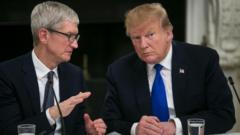Apple has announced plans to invest over $500 billion in the US over the next four years, beginning with a new advanced manufacturing facility in Texas. The tech giant anticipates creating around 20,000 new jobs, primarily focused on research and development, software engineering, and artificial intelligence (AI). However, the specifics of this investment compared to Apple's current expenditures remain unclear, as the figure encompasses a wide range of activities, from supplier spending to content production for Apple TV+.
Apple's Ambitious $500 Billion Investment in the US: A Comprehensive Overview

Apple's Ambitious $500 Billion Investment in the US: A Comprehensive Overview
Apple's strategy involves a significant commitment to manufacturing and innovation in the United States, potentially reshaping the tech landscape.
This landmark investment follows a recent meeting between Apple CEO Tim Cook and President Donald Trump, who has emphasized the importance of boosting corporate investment in the US. Apple described the commitment as its largest-ever capital expenditure. "We are bullish on the future of American innovation," Cook stated, highlighting the company's confidence in the US market.
The upcoming factory, which will span 250,000 square feet in Houston, Texas, is set to manufacture servers that were previously made overseas to enhance Apple’s AI capabilities. This facility, expected to open in 2026, will provide "thousands" of jobs. Additionally, Apple is expanding its data center capacity in several states, including North Carolina, Iowa, Oregon, Arizona, and Nevada, and doubling its US manufacturing fund from $5 billion to $10 billion, initially established during Trump's presidency.
Trump has hailed the announcement, suggesting that it reflects a positive response to his trade policies, which include the imposition of tariffs aimed at making US manufacturing more feasible. Recently, he imposed a new 10% border tax on imports from China, where Apple has a large manufacturing footprint, and proposed tariffs on imports from Mexico and Canada.
According to Dan Ives, an analyst at Wedbush Securities, this investment represents a "strategic move" by Apple to diversify its manufacturing and align with Trump's investment priorities. In a recent analysis, Ives noted that Cook is demonstrating a blend of political savvy and corporate leadership.
While Apple announced a plan to invest $430 billion in the US in 2021, resulting in 20,000 jobs over five years, the latest initiatives do not appear to signify a drastic change in Apple's manufacturing operations in China. Ives maintained that the new investments are not geared toward significantly altering Apple's focus in the country.
Overall, Apple's bold investment strategy underscores its commitment to enhancing its presence in the US market while navigating the complexities of international trade relations.
The upcoming factory, which will span 250,000 square feet in Houston, Texas, is set to manufacture servers that were previously made overseas to enhance Apple’s AI capabilities. This facility, expected to open in 2026, will provide "thousands" of jobs. Additionally, Apple is expanding its data center capacity in several states, including North Carolina, Iowa, Oregon, Arizona, and Nevada, and doubling its US manufacturing fund from $5 billion to $10 billion, initially established during Trump's presidency.
Trump has hailed the announcement, suggesting that it reflects a positive response to his trade policies, which include the imposition of tariffs aimed at making US manufacturing more feasible. Recently, he imposed a new 10% border tax on imports from China, where Apple has a large manufacturing footprint, and proposed tariffs on imports from Mexico and Canada.
According to Dan Ives, an analyst at Wedbush Securities, this investment represents a "strategic move" by Apple to diversify its manufacturing and align with Trump's investment priorities. In a recent analysis, Ives noted that Cook is demonstrating a blend of political savvy and corporate leadership.
While Apple announced a plan to invest $430 billion in the US in 2021, resulting in 20,000 jobs over five years, the latest initiatives do not appear to signify a drastic change in Apple's manufacturing operations in China. Ives maintained that the new investments are not geared toward significantly altering Apple's focus in the country.
Overall, Apple's bold investment strategy underscores its commitment to enhancing its presence in the US market while navigating the complexities of international trade relations.




















